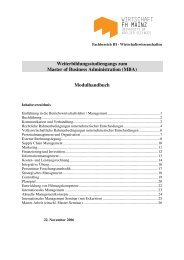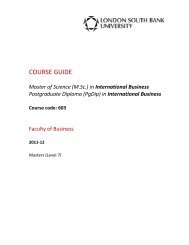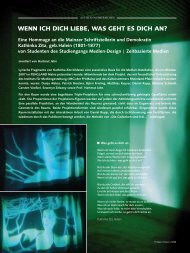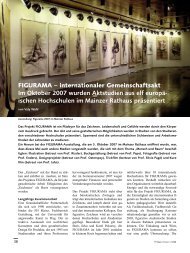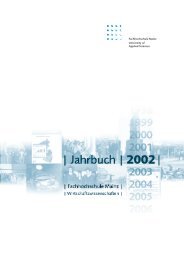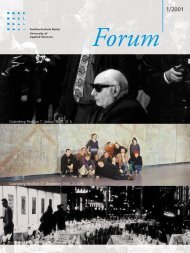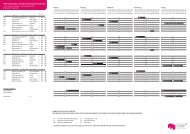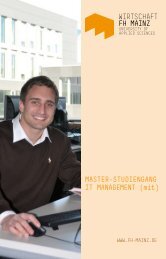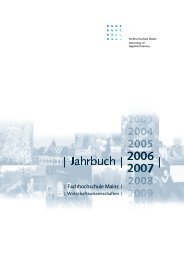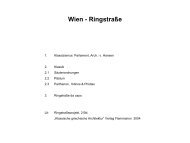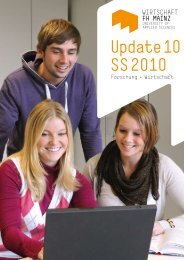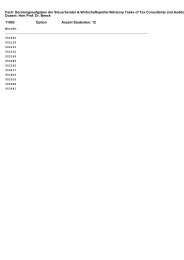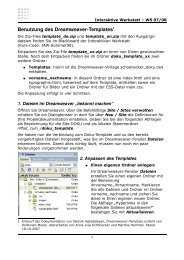ma.ib â master of arts international business - Fachhochschule Mainz
ma.ib â master of arts international business - Fachhochschule Mainz
ma.ib â master of arts international business - Fachhochschule Mainz
Create successful ePaper yourself
Turn your PDF publications into a flip-book with our unique Google optimized e-Paper software.
MA.IB –<br />
MASTER OF ARTS<br />
INTERNATIONAL<br />
BUSINESS<br />
WWW.FH-MAINZ.DE
Master <strong>of</strong> Arts<br />
International Business (MA.IB)<br />
Facts<br />
Degree: Master <strong>of</strong> Arts International Business<br />
Duration: 4 semesters fulltime<br />
Application Deadline: 15 July <strong>of</strong> the year<br />
Programme Director: Pr<strong>of</strong>. Dr. Ulrich Schüle<br />
Phone: +49 (0) 61 31.628-3253<br />
E-Mail: <strong>ma</strong>.<strong>ib</strong>@fh-<strong>ma</strong>inz.de<br />
Table <strong>of</strong> contents<br />
Page 3 Editorial<br />
Page 4 About <strong>Mainz</strong><br />
Page 5 Who is elig<strong>ib</strong>le?<br />
How will you benefit?<br />
Page 6 Programme Objectives<br />
International Focus<br />
Page 7 Partner Universities and Double Degree Opportunities<br />
Learning and Teaching<br />
Programme Structure<br />
Page 8 Programme Contents<br />
Page 11 The Teaching Team<br />
Page 12 Assessment<br />
Accreditation<br />
ECTS<br />
Page 13 Admission Requirements<br />
Page 14 Application<br />
Tuition<br />
Page 16 Contact
Editorial Pr<strong>of</strong>. Dr. Ulrich Schüle<br />
Programme Director<br />
The <strong>Fachhochschule</strong> <strong>Mainz</strong> – University <strong>of</strong> Applied Sciences has always<br />
<strong>of</strong>fered ambitious International Business programmes. Long before the<br />
implementation <strong>of</strong> the European Erasmus programmes, the European<br />
Credit Transfer System, and the Bologna process, we had established<br />
joint programmes with our partner universities in Europe and overseas.<br />
The former „Diplom“ programme in International Business provided<br />
our students with more double degree opportunities than similar programmes<br />
at other universities.<br />
Based on <strong>ma</strong>ny successful years <strong>of</strong> <strong>international</strong> <strong>business</strong> education, we<br />
have developed our new graduate programme Master <strong>of</strong> Arts Inter national<br />
Business (MA.IB) into an innovative bundle <strong>of</strong> opportunities for<br />
students in search <strong>of</strong> a challenging highlevel educational experience.<br />
The MA.IB is embedded in the prestigious Consortium <strong>of</strong> International<br />
Double Degrees (CIDD) programme which promotes exchange and<br />
double degree agreements amongst over a dozen highquality universities<br />
worldwide. This programme has been established to enable students<br />
to gain the cross cultural experience necessary to successfully<br />
apply their <strong>ma</strong>nagement skills in globally active companies.<br />
The MA.IB programme’s multidisciplinary and multilingual approach,<br />
its focus on the application <strong>of</strong> <strong>ma</strong>nagement theories and tools in case<br />
studies, the pr<strong>of</strong>essors’ own <strong>ma</strong>nagement experience in multinational<br />
companies and crosscultural consultancy, the applied projects in multinational<br />
companies, and the Master thesis in cooperation with <strong>international</strong><br />
<strong>business</strong>es, ensure that our graduates are perfectly prepared<br />
for an <strong>international</strong> <strong>business</strong> career.<br />
We are looking forward to having you join this exciting and challenging<br />
programme.<br />
Ulrich Schüle<br />
3
4<br />
About <strong>Mainz</strong><br />
<strong>Mainz</strong> is the capital <strong>of</strong> the RhinelandPalatinate, one<br />
<strong>of</strong> the 16 states (Bundesländer) <strong>of</strong> the Federal Re <br />
public <strong>of</strong> Ger<strong>ma</strong>ny, and also part <strong>of</strong> the Frankfurt<br />
RheinMain metropolitan area, Ger<strong>ma</strong>ny’s financial<br />
centre and seat <strong>of</strong> the European Central Bank. <strong>Mainz</strong><br />
is situated 27 km from the Airport <strong>of</strong> Frankfurt: due<br />
to its central location in Europe, nearly all European<br />
capitals are as close as a one or twohour flight away.<br />
The city <strong>of</strong> <strong>Mainz</strong> is an extremely attractive place<br />
for foreign students and a <strong>ma</strong>gnet for countless tourists.<br />
It is rich with cultural monuments, <strong>of</strong>fers<br />
plenty <strong>of</strong> cultural events throughout the year and<br />
<strong>ma</strong>ny leisure poss<strong>ib</strong>ilities. Broad, spacious squares<br />
and open places, lovinglyrestored halftimbered<br />
houses and <strong>ma</strong>gnificent Baroque churches give<br />
<strong>Mainz</strong>’s Old Town, its inner city, its charming, ‘old<br />
world and traditional’ or ‘gemütlich’ character. With<br />
three universities in town, <strong>Mainz</strong> hosts about<br />
35,000 students. The university campuses are located<br />
within the city limits and easily access<strong>ib</strong>le by<br />
public transportation.<br />
Without doubt: <strong>Mainz</strong> has an impressive past.<br />
Founded by the Ro<strong>ma</strong>ns 2000 years ago, <strong>Mainz</strong> has<br />
played a central role in Ger<strong>ma</strong>n history. The cathedral,<br />
seat <strong>of</strong> the bishop <strong>of</strong> <strong>Mainz</strong>, dates back to 975.<br />
The city’s most famous son, Johannes Gutenberg,<br />
printed the first b<strong>ib</strong>le in 1452. Attentive observers<br />
<strong>ma</strong>y soon notice that the city was heavily destroyed<br />
in February 1945 by air attacks. Meanwhile, even the<br />
rebuilding <strong>of</strong> the da<strong>ma</strong>ged city has become part <strong>of</strong><br />
its history.
Who is elig<strong>ib</strong>le?<br />
Do you have a Bachelor degree in ”(Business)<br />
Management” or ”Business Administration” and<br />
wish to continue your <strong>business</strong> education? Do you<br />
enjoy working in s<strong>ma</strong>ll <strong>international</strong> teams and plan<br />
to work as a <strong>ma</strong>nager in <strong>international</strong> <strong>business</strong><br />
where people from different countries cooperate in<br />
projects and jointly add value to their companies?<br />
And are you interested in courses which focus pri<strong>ma</strong>rily<br />
on applied studies rather than on developing<br />
new theories? Did you graduate with aboveaverage<br />
results? Are you multilingual?<br />
Then the MA.IB programme at <strong>Fachhochschule</strong><br />
<strong>Mainz</strong> – University <strong>of</strong> Applied Sciences is the ideal<br />
programme for you.<br />
The MA.IB programme is based on the <strong>Fachhochschule</strong>’s<br />
own Bachelor programme ”Betriebswirtschaft”.<br />
It is also open to students from other universities<br />
and welcomes applications from students<br />
worldwide.<br />
How will you benefit?<br />
The MA.IB programme allows you to acquire skills<br />
needed in <strong>international</strong> <strong>business</strong>. It broadens your<br />
knowledge adding a truly <strong>international</strong> perspective<br />
to your <strong>business</strong> education and prepares you for<br />
middle <strong>ma</strong>nagement positions and helps you to<br />
further develop your leadership skills.<br />
As a graduate <strong>of</strong> the MA.IB programme, future<br />
employers will appreciate your intellec tual capacity,<br />
your ability to cooperate in and to lead culturally<br />
diverse working groups, and your willingness to be<br />
<strong>international</strong>ly mobile. You will have <strong>ma</strong>stered<br />
applied projects and the final thesis, thus demonstrating<br />
your focus on practical, targetoriented<br />
work.<br />
With the MA.IB degree, you will clearly stand out<br />
from <strong>ma</strong>ny <strong>of</strong> the other <strong>business</strong> graduates.<br />
5
Programme Objectives<br />
The programme aims to prepare you for challenging<br />
positions in multinational companies or in <strong>international</strong>ly<br />
active public organisations. In particular, as<br />
an MA.IB graduate, you will be familiar with state<strong>of</strong>theart<br />
techniques <strong>of</strong> <strong>international</strong> busi ness and<br />
will have acquired leadership skills for a crosscultural<br />
<strong>business</strong> environment. In individual cases, the<br />
programme <strong>ma</strong>y also serve as preparation for doctoral<br />
studies in Ger<strong>ma</strong>ny or abroad.<br />
Pr<strong>of</strong>essional competence: You will increase your<br />
pr<strong>of</strong>essional competence by deepening your already<br />
existing knowledge <strong>of</strong> <strong>business</strong> issues and by adding<br />
the <strong>international</strong> dimen sion to skills and tools<br />
acquired in your undergraduate <strong>business</strong> or <strong>ma</strong>nagement<br />
studies.<br />
International Focus<br />
The MA.IB programme is truly <strong>international</strong>. Around<br />
50% <strong>of</strong> the students are recruited from outside Ger<strong>ma</strong>ny,<br />
all modules are taught and assessed in English.<br />
The <strong>international</strong> focus <strong>of</strong> the programme consists<br />
<strong>of</strong> five components:<br />
1 A onesemester studyabroad period is compulsory<br />
for you. As a stay in a foreign culture ideally<br />
prepares you for an <strong>international</strong> career and helps<br />
you to develop crosscultural <strong>ma</strong>nagement skills,<br />
we strongly recommend a twosemesterstay abroad.<br />
2 The integration <strong>of</strong> foreign students into the year<br />
in <strong>Mainz</strong> is embedded in the programme, so that<br />
crosscultural experience is not limited to the<br />
stay abroad.<br />
6<br />
Methodological expertise: You will further develop<br />
your ability to apply quantitative and qualitative<br />
analytical methods to <strong>business</strong> related studies.<br />
Social competences: You will improve your competences<br />
in self <strong>ma</strong>nagement and team work, in particular<br />
in a multicultural environment. Leadership<br />
skills, such as communication, motivation, and building<br />
trust in personal relations and organisations<br />
are developed further.<br />
Language and crosscultural <strong>ma</strong>nagement skills:<br />
A culturally diverse student body, one <strong>ma</strong>ndatory<br />
semester spent abroad, and the obligation to use<br />
foreign languages prepare you for the working environment<br />
in multinational companies and institutions.<br />
3 The exchange <strong>of</strong> pr<strong>of</strong>essors and lecturers as well<br />
as joint research programmes will further develop<br />
the university’s <strong>international</strong>isation.<br />
4 Truly <strong>international</strong> contents <strong>of</strong> <strong>business</strong> classes<br />
which are added to your already existing knowledge<br />
<strong>of</strong> <strong>business</strong> <strong>ma</strong>nagement.<br />
5 The use <strong>of</strong> English as the learning and teaching<br />
language and the obligation to use a second and<br />
even third language in the study programme prepares<br />
you for the reality <strong>of</strong> working life in multinational<br />
companies where English is the common<br />
language <strong>of</strong> video conferences and <strong>ma</strong>nagement<br />
meetings but where employees also communicate<br />
in local languages.
Partner Universities and Double Degree Opportunities<br />
MA.IB students spend their third (and fourth) semester<br />
at a university <strong>of</strong> their choice. In order to guarantee<br />
the transfer <strong>of</strong> credits, we strongly recommend<br />
the programmes <strong>of</strong> our part ner universities.<br />
More than a dozen partner universities in Europe,<br />
Asia, Australia, and both Americas guarantee the<br />
integration <strong>of</strong> MA.IB students into their program<br />
Learning and Teaching<br />
Seminars, group discussions, case studies and role<br />
plays assigned to s<strong>ma</strong>ll teams <strong>of</strong> students are used to<br />
integrate the abovementioned competences. The<br />
Master programme is based on a studentcentred<br />
learning approach so that classcontact hours <strong>ma</strong>y<br />
be rather used for discussion than traditional lectures.<br />
Social competences and leadership skills are<br />
developed through field research, team assignments<br />
and projects, and the presentation and defence <strong>of</strong><br />
the Master thesis.<br />
Learning and teaching is focused on applied studies.<br />
Thus, theories and models are learned and taught<br />
within the context <strong>of</strong> their application to <strong>international</strong><br />
<strong>business</strong> issues and applied in practical projects,<br />
case studies, and <strong>ma</strong>rket analyses. Company visits<br />
and the invitation <strong>of</strong> company representatives to<br />
Programme Structure<br />
Semester IV<br />
30 ECTS / 2 HpW<br />
Semester III<br />
30 ECTS / 17 HpW<br />
Semester II<br />
30 ECTS / 20 HpW<br />
Semester I<br />
30 ECTS / 20 HpW<br />
2 HpW<br />
Total<br />
120 ECTS / 61 HpW<br />
Applied Project Option I<br />
(abroad)<br />
10 ECTS / 4 HpW<br />
Leadership and<br />
Organisation<br />
5 ECTS / 4 HpW<br />
5 ECTS / 3 HpW<br />
Strategic Management<br />
5 ECTS / 4 HpW<br />
Quantitative Analytical<br />
Methods<br />
5 ECTS / 4 HpW<br />
mes. Some <strong>of</strong> them even award their own degree in<br />
addition to the <strong>Mainz</strong> MA.IB degree.<br />
A list <strong>of</strong> the current partner universities and double<br />
degree opportunities can be downloaded from the<br />
MA.IB programme’s web page (http://<strong>ma</strong><strong>ib</strong>.fh<strong>ma</strong>inz.de).<br />
participate in class discussions help to integrate the<br />
practical company view into academic studies. Also,<br />
the Master thesis deals with reallife issues <strong>of</strong> <strong>business</strong>es<br />
in an <strong>international</strong> environment. Ideally, students<br />
write the thesis in cooperation with a company<br />
while combining desk with field research.<br />
English as the language <strong>of</strong> instruction and assessment,<br />
courses in a second foreign language, the integration<br />
<strong>of</strong> visiting pr<strong>of</strong>essors in teaching and exchange students<br />
in learning groups, the use <strong>of</strong> text books and<br />
articles published by authors from different p<strong>arts</strong> <strong>of</strong><br />
the world, and the obligation to spend one or two<br />
se mesters semesters abroad guarantee that students<br />
on this programme are immersed in an <strong>international</strong><br />
setting suitable for preparing them for a career in<br />
multinational companies or <strong>international</strong> institutions.<br />
Master-Thesis (inkl. Master-Seminar) at FH <strong>Mainz</strong> or a partner university<br />
Option II<br />
(abroad)<br />
5 ECTS / 3 HpW<br />
International Finance<br />
5 ECTS / 4 HpW<br />
Business Research<br />
5 ECTS / 2 HpW<br />
30 ECTS / 2 HpW<br />
Induction Week (2 HpW)<br />
HpW = Hours per week<br />
Option III<br />
(abroad)<br />
5 ECTS / 3 HpW<br />
International Marketing &<br />
Export Management<br />
5 ECTS / 4 HpW<br />
Financial Reporting<br />
5 ECTS / 4 HpW<br />
Option IV<br />
(abroad)<br />
5 ECTS / 3 HpW<br />
International Business<br />
Law<br />
5 ECTS / 2 HpW<br />
International Business<br />
Environment<br />
5 ECTS / 2 HpW<br />
Option V<br />
(abroad)<br />
5 ECTS / 3 HpW<br />
Foreign Language<br />
5 ECTS / 4 HpW<br />
Foreign Language<br />
5 ECTS / 4 HpW<br />
7
Programme Contents<br />
Core Modules<br />
International Business Environment: World trade<br />
and world financial flows as well as exchange rate<br />
issues are analysed from a <strong>ma</strong>croeconomic and<br />
<strong>business</strong> perspective. Students learn how political<br />
economy and <strong>business</strong> strategies <strong>of</strong> multinational<br />
companies are linked. The module also discusses the<br />
role <strong>of</strong> inter national institutions such as the WTO,<br />
IMF, and World Bank. Winter term.<br />
International Business Law: The module descr<strong>ib</strong>es<br />
and analyses the legal framework <strong>of</strong> <strong>international</strong><br />
trade including UNCITRAL, EU law and <strong>international</strong><br />
organisations. It also deals with access to <strong>ma</strong>rkets<br />
including ICC rules on delivery and payment<br />
terms, licences, intellectual property rights, and<br />
antitrust issues. Summer term.<br />
Leadership and Organisation: Students learn about<br />
the interrelationship <strong>of</strong> leader ship, organisational<br />
8<br />
behaviour, change, and economic success. They<br />
learn about theories <strong>of</strong> hu<strong>ma</strong>n interactions in organisations<br />
and broaden their view <strong>of</strong> <strong>ma</strong>nagement by<br />
adding components <strong>of</strong> organisational psychology.<br />
Winter term.<br />
Strategic Management: Participants learn about<br />
strategic <strong>ma</strong>nagement and <strong>business</strong> policy. The<br />
module integrates the various views <strong>of</strong> <strong>ma</strong>rketing,<br />
finance, accounting, and leader ship modules into<br />
cases. Lectures are kept short; case studies in s<strong>ma</strong>ll<br />
teams in and outside class as well as presentations<br />
are used in order to strengthen the students’ analytical<br />
skills, and encourage them to take a problemrelated<br />
work approach. Summer term.<br />
Financial Reporting: Students learn about <strong>international</strong><br />
accounting principles and their application in<br />
different world trade areas. In particular, USGAAP<br />
and IFRS form the basis <strong>of</strong> analysis. The module<br />
enables students to ”read” income statements <strong>of</strong>
multinational enterprises published in different economic<br />
areas. They are also able to analyse the impact<br />
<strong>of</strong> these differences on selected accounting topics –<br />
from goodwill and intang<strong>ib</strong>les to foreign currency<br />
transactions. Moreover, they understand the implications<br />
<strong>of</strong> the accounting principles on <strong>ma</strong>nagement<br />
control and budgeting practices. Winter term.<br />
International Corporate Finance: This module<br />
covers issues <strong>of</strong> corporate finance in an <strong>international</strong><br />
environment with a focus on multinational companies.<br />
Students apply the tools presented in class to<br />
exercises and cases. In contrast to finance modules<br />
at undergraduate level, students focus on multinational<br />
enterprises. The discussion <strong>of</strong> risk <strong>ma</strong>nagement<br />
and exchange rate issues are closely linked to<br />
the contents <strong>of</strong> the modules ”International Business<br />
Environment” and ”International Marketing and<br />
Export Management”. Summer term.<br />
International Marketing and Export Management:<br />
Students learn about the principles <strong>of</strong> exportbased,<br />
multidomestic and global approaches <strong>of</strong> <strong>international</strong><br />
<strong>ma</strong>rketing and their implications for product<br />
and price positioning as well as placement and communication.<br />
They also understand and know how to<br />
apply the <strong>ma</strong>jor <strong>ma</strong>nagement tools to export operations<br />
including export finance and risk <strong>ma</strong>nagement.<br />
The module consists <strong>of</strong> lectures and seminars the<br />
students apply their know ledge to cases and present<br />
the results <strong>of</strong> their cases in class. Thus, the module<br />
also trains self<strong>ma</strong>nagement, working in s<strong>ma</strong>ll<br />
teams, and the students’ ability to discuss the results<br />
<strong>of</strong> their work controversially. Summer term.<br />
Quantitative Analytical Methods: The course gives<br />
an overview and stresses the application <strong>of</strong> intermediate<br />
<strong>ma</strong>the<strong>ma</strong>tical and statistical methods to <strong>business</strong><br />
cases. This enables the students to design and<br />
test their own research theses. In general, the<br />
course strengthens their knowledge <strong>of</strong> analytical<br />
research and provides them with the tools needed<br />
for analytical work in further studies. Winter term.<br />
Business Research: Participants learn about academic<br />
standards and ethical questions in research,<br />
their application in desk and field research and writing<br />
papers. In particular, the role <strong>of</strong> description and<br />
analysis, the application <strong>of</strong> statistics and figures,<br />
citing and referencing are explained and trained in<br />
s<strong>ma</strong>ll exercises. Moreover, the course provides them<br />
with an overview <strong>of</strong> l<strong>ib</strong>raries and other sources for<br />
academic research. Students also learn to apply different<br />
interviewing techniques and question naire<br />
designs to several research objectives (for example,<br />
explorative versus representative studies) and to<br />
typical <strong>business</strong>related research topics. Winter<br />
term.<br />
9
Options<br />
Options: Participants take courses at the host university<br />
and transfer the credits as options. Class contact<br />
hours and assessments are subject to the host<br />
university’s rules. Exchange students from partner<br />
universities <strong>ma</strong>y transfer courses they took at their<br />
home university during the first year either as options<br />
or – if applicable – first year modules. In the<br />
case that incoming exchange students speak Ger<strong>ma</strong>n,<br />
they are entitled to take courses <strong>of</strong> the Ger<strong>ma</strong>n Master<br />
programme in Business Administration. These<br />
courses cover Marketing, HRM, Accounting, Management,<br />
PR and Communication and Finance topics.<br />
In addition, a module on ”Doing Business in Ger<strong>ma</strong>ny”<br />
is <strong>of</strong>fered to all incoming exchange students<br />
(under graduate and postgraduate) which <strong>ma</strong>y be<br />
taken as option.<br />
10<br />
Language Options: FH <strong>Mainz</strong> – University <strong>of</strong> Applied<br />
Sciences <strong>of</strong>fers courses <strong>of</strong> ”Ger<strong>ma</strong>n language and<br />
culture” at three different levels – beginners, intermediate<br />
and academic. These courses are open to<br />
undergraduate and postgraduate students. Participants<br />
are assigned to the courses according to their<br />
speaking and writing skills. Students pr<strong>of</strong>icient in<br />
Ger<strong>ma</strong>n take courses in French, Spanish, or Chinese.<br />
Other languages might be <strong>of</strong>fered in cooperation<br />
with other programmes. Winter and summer term.<br />
Applied Project<br />
Participants apply the analytical tools learned in the<br />
first two semesters to a reallife case. Ideally, students<br />
do the applied project work in an <strong>international</strong><br />
company in the summer break between the first<br />
and second year <strong>of</strong> studies. As students usually move<br />
from <strong>Mainz</strong> to a partner university – or from the<br />
partner university to <strong>Mainz</strong> – the applied project<br />
<strong>ma</strong>y be supervised by the partner university abroad.<br />
In exceptional cases, in particular when students do<br />
not <strong>ma</strong>nage to find a company for their practical<br />
project, the partner university or FH <strong>Mainz</strong> – University<br />
<strong>of</strong> Applied Sciences will assign a larger case<br />
study to them as a practical project. After completion<br />
<strong>of</strong> the project, the learning success has to be reported<br />
back to the supervisor.<br />
Master Thesis<br />
In their final semester, students work on their Master<br />
thesis which consists <strong>of</strong> a research project on an<br />
<strong>international</strong> <strong>business</strong> issue. The Master thesis <strong>ma</strong>y<br />
be combined with an internship in a multinational<br />
company or consist <strong>of</strong> an independent research project.<br />
In the thesis, the students apply the theories<br />
and tools they learned in their studies to a reallife<br />
<strong>business</strong> problem. Usually, the student’s own analysis<br />
is based on an empirical study. Depending on the<br />
nature <strong>of</strong> the study, the length <strong>of</strong> the paper <strong>ma</strong>y be<br />
between 12,500 and 17,500 words.
The Teaching Team<br />
As the FH <strong>Mainz</strong> – University <strong>of</strong> Applied Sciences<br />
focuses on applied studies and re search, pr<strong>of</strong>essors<br />
and lecturers are required to prove their own <strong>ma</strong>nagement<br />
experience outside <strong>of</strong> the university world<br />
before they start teaching. As a prerequisite for<br />
teaching in the MA.IB programme, they are also<br />
required to have studied and/or worked in an English<br />
speaking environment abroad. Their experience ranges<br />
from expatriate status to independent <strong>business</strong><br />
and government consulting. Furthermore, all <strong>of</strong><br />
them are experienced in teaching classes in English<br />
to a culturally diverse audience. Their teaching sty<br />
les are participative and encourage students to develop<br />
their own viewpoint.<br />
Pr<strong>of</strong>essors and lecturers view themselves as a team;<br />
thus, they meet on a regular basis to discuss the<br />
course contents, to coordinate their activities and<br />
to jointly adapt contents to new developments in<br />
theories and <strong>business</strong> practices.<br />
Visiting pr<strong>of</strong>essors from abroad and guest lecturers<br />
from <strong>international</strong> companies regularly contr<strong>ib</strong>ute<br />
to the programme.<br />
11
Assessment<br />
Assessment takes place in the form <strong>of</strong> written and<br />
oral examinations, essays, case studies, presentations,<br />
and the Master thesis. This mix allows you to<br />
demonstrate a wide range <strong>of</strong> abilities and is a fair<br />
basis for assessment. Assessment focuses on your<br />
analytical skills and their application to cases as well<br />
as on the development <strong>of</strong> solutions to <strong>international</strong><br />
<strong>business</strong> problems. The <strong>ma</strong>rking system is based on<br />
ECTS rules.<br />
Accreditation<br />
The MA.IB programme is accredited by the Ger<strong>ma</strong>n<br />
accreditation agency AQAS and the State Ministry<br />
<strong>of</strong> Education. Moreover, it is incorporated in the<br />
Consortium <strong>of</strong> Inter natio nal Double Degrees (CIDD).<br />
12<br />
ECTS<br />
ECTS stands for European Credit Transfer System<br />
and consists <strong>of</strong> two components:<br />
1 Work load <strong>of</strong> students. 30 ECTS credits correspond<br />
to one semester and are based on the<br />
students’ total study time including class contact<br />
hours as well as time spent on research<br />
and l<strong>ib</strong>rary work.<br />
2 ECTS <strong>ma</strong>rks. Marks achieved in different national<br />
systems are translated into a panEuropean<br />
<strong>ma</strong>rking system. Thus, <strong>ma</strong>rks achieved in different<br />
systems are <strong>ma</strong>de comparable.
Admission Requirements<br />
If you wish to apply for the MA.IB programme at the<br />
School <strong>of</strong> Business you need to meet the following<br />
criteria:<br />
1. You hold a degree in Management!<br />
You hold a Bachelor degree in Management or<br />
Business studies (3 years fulltime or 180 ECTS<br />
minimum) with aboveaverage <strong>ma</strong>rks. The minimum<br />
requirement is ECTS <strong>ma</strong>rk „C“, or an average<br />
grade <strong>of</strong> your bachelor degree <strong>of</strong> 2,5 (according<br />
to the Ger<strong>ma</strong>n grading system) or better.<br />
2. You are multilingual!<br />
You speak at least three different languages where<strong>of</strong><br />
one has to be English (e.g. English, Ger<strong>ma</strong>n, Russian<br />
or English, French, Chinese etc.). A working<br />
knowledge <strong>of</strong> two languages other than English is<br />
required for admission to the programme. Ger<strong>ma</strong>n<br />
is not a requirement. However, if you start in the<br />
MA.IB courses <strong>of</strong> Ger<strong>ma</strong>n language and culture<br />
are <strong>ma</strong>ndatory for students with no or rudimentary<br />
skills in Ger<strong>ma</strong>n.<br />
English:<br />
o If English is your native language:<br />
high school diplo<strong>ma</strong><br />
o If English is not your native language, you<br />
must present one <strong>of</strong> the following tests:<br />
• the TOEFL, not older than two years, with<br />
at least 92 points (Internetbased) or<br />
237 points (Computerbased)<br />
• an IELTS score <strong>of</strong> at least 6.5<br />
• a TOEIC score <strong>of</strong> at least 800 points<br />
Your native language (if other than English):<br />
• high school diplo<strong>ma</strong><br />
Other languages:<br />
• certificates issued by government agencies,<br />
universities or language training institutes<br />
which certify that you <strong>ma</strong>ster the language<br />
at the level B2 <strong>of</strong> the Common European<br />
Framework (CEFR) – you <strong>ma</strong>y use the<br />
form in the application package.<br />
The MA.IB board <strong>of</strong> examiners decides upon<br />
the equivalence <strong>of</strong> evidence.<br />
3. You are highly motivated!<br />
You are asked to present a letter (approxi<strong>ma</strong>tely<br />
two pages) explaining your motivation for studying<br />
the MA.IB Programme. The MA.IB board <strong>of</strong><br />
examiners has the right to conduct (telephone)<br />
interviews in order to test your motivation.<br />
4. You have a regional preference<br />
We ask you to indicate your regional preferences for<br />
your study abroad stay in the application you submit.<br />
5. Please Note:<br />
o You must add the application form (direct<br />
applicant or exchange student) when sending<br />
your application papers.<br />
o You must send certified copies <strong>of</strong> your certificates.<br />
o You must present clear and legal documentation<br />
that can you fulfil the MA.IB prerequisites.<br />
o Application deadline is July 15th <strong>of</strong> the year!<br />
13
Application<br />
If you are interested starting the MA.IB Programme<br />
please complete the application form corresponding<br />
to your prerequisites.<br />
1. Applicants from partner universities<br />
o Please download the Application Package for<br />
Exchange Students and send it to the FH <strong>Mainz</strong><br />
– University <strong>of</strong> Applied Sciences<br />
2. Ger<strong>ma</strong>n applicants and applicants with a Bachelor<br />
degree awarded by a university within the European<br />
Union<br />
o Please download the Application Package for<br />
Direct Applicants and send it to the FH <strong>Mainz</strong><br />
– University <strong>of</strong> Applied Sciences<br />
3. Applicants with a Bachelor degree awarded by a<br />
Tuition<br />
The question <strong>of</strong> tuition is being discussed in several<br />
European countries. Some have already introduced<br />
tuition fees, others are expected to do so soon.<br />
1 First year in <strong>Mainz</strong><br />
Students with a Ger<strong>ma</strong>n or <strong>international</strong> Bachelor<br />
degree: tuition free!<br />
Students with a Ger<strong>ma</strong>n „Diplom“ degree and students<br />
who already hold a Master degree: tuition fee <strong>of</strong><br />
EUR 650.00 per semester (applicants with a credit<br />
balance on their RhinelandPalatinate „Studien konto“<br />
<strong>ma</strong>y use these credits).<br />
MA.IB-Students 2009 at the FH <strong>Mainz</strong><br />
14<br />
university outside <strong>of</strong> the European Union<br />
o Please download the Application Package for<br />
NonEU Applicants and send it to Uniassist<br />
4 For Ger<strong>ma</strong>n Students only:<br />
Ab dem Wintersemester 2011/12 ist eine Bewerbung<br />
nur noch in elektronischer Weise möglich. Hierzu<br />
steht über den Internetauftritt der <strong>Fachhochschule</strong><br />
<strong>Mainz</strong> (www.fh<strong>ma</strong>inz.de) die Funktion einer Online<br />
Bewerbung zur Verfügung. Das elektronisch ausgefüllte<br />
Antragsformular ist vor Ablauf der Bewerbungsfrist<br />
an die <strong>Fachhochschule</strong> zu übermitteln. Darüber hinaus<br />
ist sicherzustellen, dass das ausgedruckte und<br />
unterschriebene Antragsformular samt den erforderlichen<br />
Unterlagen (Application Package unter Punkt 2)<br />
fristgerecht der <strong>Fachhochschule</strong> <strong>Mainz</strong> zugehen.<br />
2 Social fee: all students will have to pay a social fee <strong>of</strong><br />
approx. EUR 220, per semester which also includes<br />
a public transport ticket for the RhineMain area.<br />
3 Second year at partner universities<br />
Tuition for the second year stay at the partner uni versity<br />
follows the cost <strong>of</strong> the host university. Therefore,<br />
tuition has to be paid at the partner university.<br />
In some countries, a limited number <strong>of</strong> MA.IB<br />
students are accepted tuition free.<br />
The current tuition fees and exemptions through<br />
tuition swap can be downloaded from the MA.IB<br />
programme’s web page (www.fh<strong>ma</strong>inz.de).
Contact<br />
Questions concerning programme organisation and<br />
admission:<br />
Programme Manager Judith Busch<br />
Imprint<br />
Phone: +49 (0) 61 31.6 28-3414<br />
Fax: +49 (0) 61 31.6 28-93 414<br />
E-Mail: <strong>ma</strong>.<strong>ib</strong>@fh-<strong>ma</strong>inz.de<br />
Editor <strong>Fachhochschule</strong> <strong>Mainz</strong><br />
Fachbereich Wirtschaft / School <strong>of</strong> Business<br />
University <strong>of</strong> Applied Sciences<br />
Lucy-Hillebrand-Straße 2<br />
D-55128 <strong>Mainz</strong><br />
Design/Production Gievers Design,<br />
D-55294 Bodenheim<br />
Photos <strong>Fachhochschule</strong> <strong>Mainz</strong>, Eva Willbacher<br />
Copyright <strong>Fachhochschule</strong> <strong>Mainz</strong>, May 2011



